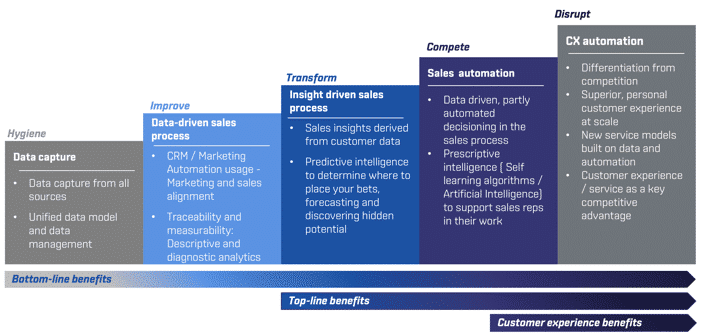Bridging the gap between sales and marketing: We here at Avaus have talked for a long time about the need in aligning sales and marketing within B2B companies – When we talk with sales managers, we hear “I’ve never received a good lead from our marketing!” and vice versa the marketing department tells us that “Sales guys don’t follow up with the leads we provide – we don’t even know what happens to them!”.
There is a clear need for bridging this gap. Luckily, now we have the technology to help us solve just that:
Salestech – new sales enablement and support tools are today implemented all over the B2B world. Call it CRM on steroids. Sales hacking, revenue-stack are new buzzwords mimicking the parallel trend in marketing. Technologies harness AI to track sales activities, analyse sales conversations, engage automatically with prospects, to name a few use cases.
B2B martech has been a couple of years ahead of the present salestech boom, invading the traditionally technology-poor marketing function with vengeance. Martech has provided cool toolboxes for automated lead management, Account-Based Digital Marketing and high-end analytics just for almost a decade now.
Amazingly, all this proliferation of digital technologies still happening in most firms within the traditional silos of the sales and marketing functions. Why have sales- and martech failed to deliver on one of its core promises – to bridge this quintessential gap? Sales managers continue to complain that sales qualified leads aren’t qualified enough and marketing heads are red flagging that potential revenues are evaporating because of unattended opportunities, identified by the marketing team. Does all this sound familiar?
It is easy to blame people and poor management. A fool with more tools is still a fool, albeit a bigger one than the fool with less. At Avaus, we have been working with and listening to both sides for some years now. We strongly believe that the solution lies neither within the marketing nor the sales function or how they are managed. We think there is a missing link in between – Sales Intelligence.

Exhibit 1: Sales intelligence wants to transfer high value from marketing to sales while relaying the best sales-insights back to marketing.
Sales intelligence is simply put an upgrade of the new business function for the digital enterprise. For almost a century the unchallenged tech tool for sales used to be the telephone. Sales intelligence is today equipped with a completely new set of digital tools as well as with an independent mindset, ready to challenge stubborn sales and marketing directors. Sales intelligence caters to a new breed of analytically minded, tech-savvy business developers. Some call them business hackers, as they are looking for long-term sustainable and incremental small gains instead of the big quick wins. The SI team often also employs a new kind of workforce – virtual agents.
Sales intelligence is the guardian of the quality of leads from marketing activities. The success of a sales intelligence officer is ultimately measured only by sales conversions. He also ensures the feedback loop back from sales to marketing. This creates a virtuous circle of growing insights, optimisation of marketing activities and incrementally better sales results.
Sales intelligence extends far beyond qualifying leads. From a marketing perspective, SI will track and analyse digital customer journeys, enable content personalisation and predictive insights. SI will also recommend next best actions and provide prescriptive insights for sales. A great example of advanced SI in action is CenturyLink, an US-based telecommunications provider. The company uses Angie, an AI-powered sales assistant, that can handle, connect and engage with 90 000 leads per quarter. To learn more check out the video
How Do You Move Forward?
Are the basics in place? Do you already have need a comprehensive data strategy, quality data capture governance, a CRM and marketing automation system in place? If not, start working on them.
You will need to re-assess your marketing and sales processes and make necessary adjustments to accommodate a sales intelligence team in the middle.
Audit your capabilities – do you have the right in-house competences and technologies for sales Intelligence or do you have to acquire them?

Exhibit 2: How do you move forward?
Written by Kaisa Niiranen
Contact us